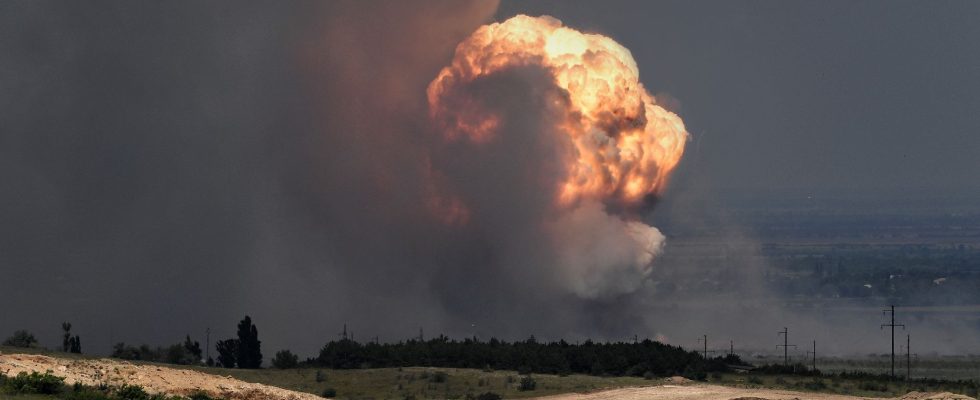The confrontation by interposed drones is accentuated in Ukraine. Early this Saturday, August 12, the Russian Ministry of Defense was delighted to have thwarted a new attack by Ukrainian drones against the Crimean peninsula, annexed by Russia since 2014.
According to the message published on the official channel of the ministry on Telegram messaging, twenty Ukrainian drones would have tried in the night to target Russian objectives on the occupied territory. Fourteen Ukrainian drones were thus destroyed by air defense, while six others were neutralized by “electronic warfare means”, specifies AFP, relying on the ministry.
An attack which would not have caused either victims or damage, also specifies the Russian authority, but which is part of a recent context of multiplication of drone attacks by Ukraine, including on Russian soil. The day before, the Russian army also claimed to have shot down a Ukrainian drone in western Moscow.
EU delivered more than 200,000 shells to Ukraine
The arsenal sent by the European Union to Ukraine is varied: “long-range self-propelled artillery, precision-guided munitions and mortar munitions […] and 2,300 missiles of all types”, details EU spokesman Peter Stano. On Friday August 11, the Twenty-Seven announced that they had delivered 223,800 shells to Ukraine to support the country against the invader A shipment valued at 1.1 billion euros, according to the EU, and carried out as part of the first part of a plan to eventually supply one million 155 mm artillery shells by next spring.
A total military aid of two billion euros, taken from the stocks of the Member States, also planning to finance joint purchases of ammunition for kyiv. If this project seeks to respond to the shortage of ammunition in the Ukrainian army, the European Union seems however far from reaching its objective of one million shells delivered within a year, according to AFP. In total, the 27 member states have spent around 20 billion euros supplying arms to Ukraine since the start of the Russian invasion in February 2022.
Belarus tries to ease border tensions with Poland
Belarus is playing the diplomacy card in the face of tensions with its Polish neighbor. On Friday, Belarusian President Alexander Lukashenko said he had ordered his government to resume contact with Poland, deeming it “necessary to speak with the Poles”. A statement made in a context of tensions between the two countries: beyond Warsaw’s support for Ukraine and Minsk for Russia, relations between the two nations have soured since the arrival at the end of June of Russian mercenaries of Wagner on Belarusian soil. Military training at the borders notably prompted Poland to announce on Thursday the deployment of 10,000 soldiers in these areas.
If the Belarusian president seems to be betting on dialogue, ordering “the Prime Minister to contact them”, he also considered that the Polish announcement on Thursday sought to “aggravate the situation, in order to show that they have correctly armed and rearmed the country”. For Pawel Jablonski, Polish Deputy Minister of Foreign Affairs, “Lukashenko’s words remain in contradiction with his actions”, calling instead on the autocrat to stop “attacking our border” and to return “freedom to more than a thousand of political prisoners”.
Russian anti-war netizen sentenced to 6 years in prison
Civil society censorship continues in Russia. A Moscow region court on Friday sentenced a musician and environmental activist to six years in a penal camp. His crime: the publication of three messages on the social network VKontakte criticizing the Russian invasion in Ukraine. At 51, Alexander Bakhtin had thus denounced in March and April 2022 the Russian military campaign in Ukraine and the civilian victims which he attributed to Vladimir Putin. He was finally arrested in March 2023 and then charged with spreading “false information” about the Russian army.
An accusation regularly used to suppress voices critical of the conflict: thousands of anonymous Russians and famous opponents have been arrested and sentenced to fines and prison terms in Russia since the start of the war in February 2022. In addition to his sentence of penal colony, the musician and activist will also have to consult a psychiatrist during his detention, according to the verdict confirmed by one of his friends present at the hearing and by the Russian NGO OVD-Info.
